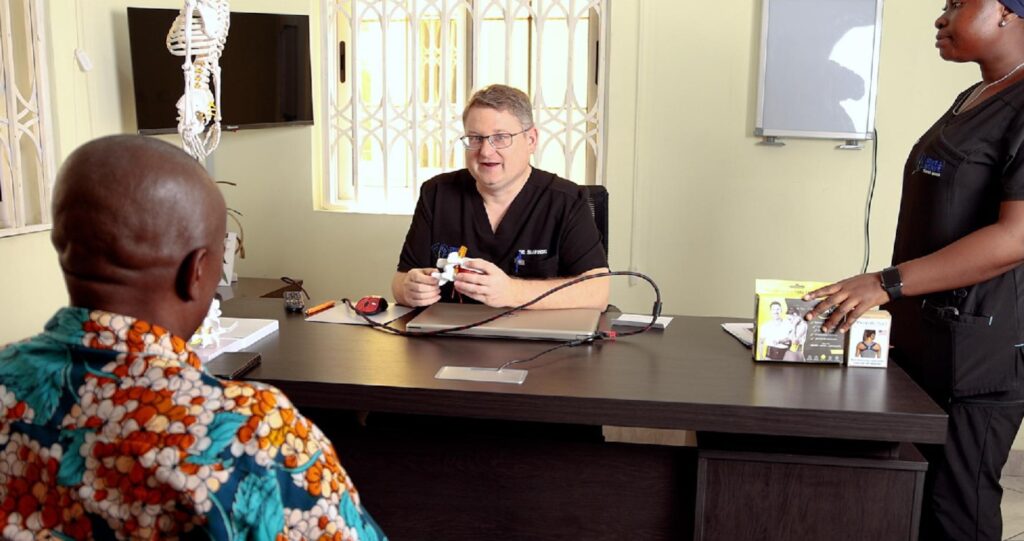Peripheral neuropathy is a condition that affects the peripheral nerves, the vast communication network that sends signals between the central nervous system (the brain and spinal cord) and the rest of the body. When these nerves are damaged, it can lead to a range of uncomfortable and sometimes
debilitating symptoms, including numbness, tingling, burning sensations, and a feeling of “pins and needles” in the extremities like the legs, feet, arms, and hands. At Spine and Nerve Center Ghana, we are committed to helping our patients understand this condition and explore treatment options that can
improve their quality of life.
What is Peripheral Neuropathy?
Peripheral neuropathy refers to the damage or dysfunction of one or more peripheral nerves. These nerves play a crucial role in transmitting sensory information (like temperature, pain, and touch) and motor signals (which control muscle movement) from the central nervous system to the rest of the
body. When these nerves are compromised, it can disrupt communication and lead to a variety of symptoms.
Peripheral neuropathy can affect different types of nerves:
Sensory Nerves: Responsible for sensations such as pain, temperature, and touch.
Motor Nerves: Control muscle movement and strength.
Autonomic Nerves: Regulate involuntary functions like heart rate, blood
pressure, digestion, and bladder control.
The condition can be classified based on the number of nerves affected:
Mononeuropathy: Involves damage to a single nerve.
Polyneuropathy: Involves damage to multiple nerves and is the most common type of peripheral neuropathy.
Autonomic Neuropathy: Involves damage to the autonomic nerves, which can affect internal organs.
Causes of Peripheral Neuropathy
Peripheral neuropathy can be caused by various factors, including:
1. Diabetes: One of the most common causes of peripheral neuropathy, particularly in the form of diabetic neuropathy, where high blood sugar levels cause nerve damage over time.
2. Trauma or Injury: Physical injuries, such as fractures or compression of nerves (e.g., carpal tunnel syndrome), can lead to nerve damage.
3. Infections: Certain infections like Lyme disease, shingles (herpes zoster), HIV/AIDS, and hepatitis C can cause peripheral neuropathy.
4. Autoimmune Diseases: Conditions like rheumatoid arthritis, lupus, and Guillain-Barré syndrome can cause the immune system to mistakenly attack peripheral nerves.
5. Toxins: Exposure to toxic substances, such as heavy metals, chemotherapy drugs, and certain industrial chemicals, can damage peripheral nerves.
6. Alcoholism: Chronic alcohol abuse can lead to nutritional deficiencies, particularly in vitamin B1 (thiamine), which is essential for nerve health.
7. Nutritional Deficiencies: Deficiencies in vitamins like B1, B6, B12, and E can lead to nerve damage.
8. Genetic Disorders: Inherited conditions like Charcot-Marie-Tooth disease can cause peripheral neuropathy.
9. Medications: Some medications, especially those used in chemotherapy, can have neuropathy as a side effect.
10. Kidney Disease: Chronic kidney disease can lead to the buildup of toxins in the blood, which can damage nerves.
11. Idiopathic Causes: In some cases, the cause of peripheral neuropathy may be unknown (idiopathic neuropathy).
Symptoms of Peripheral Neuropathy
The symptoms of peripheral neuropathy can vary depending on the type and extent of nerve damage. Common symptoms include:
1. Numbness and Tingling: A common early symptom, particularly in the hands, feet, arms, and legs.
2. Burning Sensation: Some patients report a burning pain, especially in the lower extremities.
3. Pins and Needles: A prickling or “pins and needles” sensation is often experienced.
4. Sharp, Stabbing Pain: Some individuals experience sharp or shooting pain that can be sudden and intense.
5. Sensitivity to Touch: Even a light touch can cause significant pain in affected areas.
6. Muscle Weakness: Damage to motor nerves can lead to muscle weakness, difficulty with coordination, and a decreased ability to perform fine motor tasks.
7. Loss of Balance: As peripheral nerves are involved in proprioception (the sense of body position), neuropathy can lead to balance problems.
8. Autonomic Symptoms: In cases involving autonomic nerves, symptoms can include abnormal sweating, gastrointestinal issues (like constipation or diarrhoea), blood pressure changes, and heart rate irregularities.
9. Ulcers and Infections: Due to reduced sensation, especially in the feet, minor injuries can go unnoticed and lead to ulcers, infections, and even amputation if not properly managed.

STAGES OF PERIPHERAL NEUROPATHY
Peripheral neuropathy has the tendency to deteriorate with time, just like many other medical disorders. It is not always simple to determine the extent of the harm; though neuropathy progresses through several stages, none of which are always obvious.
Stage One
In the beginning stages of neuropathy, you will experience some pain and numbness. These symptoms won’t be persistent, but you will notice them coming and going. These first symptoms of pain and numbness may be subtle, but you will recognize that they are there. For example, you may notice some slight tingling or numbness in your hands and feet, but it eventually goes away. Another early sign of neuropathy may be that you notice your balance and reflexes are a little out of tune compared to what they normally are. Oftentimes, the first symptoms recur every few weeks, and grow to become more consistent. It is common for people to ignore the first signs of neuropathy because they are so subtle.
Stage Two
The second stage of peripheral neuropathy occurs when your pain and numbness become more regular and consistent. It is difficult to pinpoint exactly when a patient’s neuropathy progresses into the second stage, but it will become obvious when the pain and numbness is felt more often than in the past. In the second stage, it becomes more difficult to ignore the pains, numbness, and other symptoms that are present. This is the stage in which many people recognize that something may be wrong, and seek help from a doctor.
Stage Three
In the third stage of neuropathy, your pain is occurring daily, or almost every day. In this stage, the pain begins to affect your daily activities, and prevents you from going about your day as you would normally. At this point, it becomes difficult to treat.
Stage Four
In the fourth stage of neuropathy, your legs and feet will become very numb. This is due to the lack of healthy nerves that are able to carry signals to your brain. You may notice an increase in numbness and a decrease in your pain, but this is not a good thing. When this happens, it is a sign that the nerves are dying and a good majority of the nerve fibres have disintegrated. At this point, the larger nerve fibres are beginning to become irreversibly damaged. In this stage, it is likely that your balance is affected, and it may become difficult to walk and keep your balance.
Stage Five
This is the final stage of neuropathy, and it is where you’ve lost any and all feeling in your lower legs and feet. You do not feel any pain, just intense numbness. This is because there are no nerves that are able to send signals to your brain. At this stage, walking has become very difficult, and your balance is severely affected. You may become so unsteady that you have to use a wheelchair. In stage five, your nerves are permanently damaged, but it may be possible to regenerate some of your nerve fibres.
Diagnosis of Peripheral Neuropathy
Diagnosing peripheral neuropathy involves a combination of clinical evaluation, medical history, and diagnostic tests:
1. Medical History and Physical Examination: The doctor will take a detailed history of symptoms, medical conditions, and potential exposure to toxins or medications. A thorough physical exam, including a neurological assessment, will help determine the extent and pattern of nerve involvement.
2. Blood Tests: Blood tests can help identify underlying conditions like diabetes, vitamin deficiencies, infections, or autoimmune diseases that may be causing neuropathy.
3. Electromyography (EMG) and Nerve Conduction Studies (NCS): These tests measure the electrical activity of muscles and the speed of nerve signals, helping to pinpoint nerve damage.
4. Imaging Studies: MRI or CT scans may be used to detect structural abnormalities or compressions that could be affecting nerves.
5. Nerve Biopsy: In some cases, a small sample of nerve tissue may be taken for further examination.
6. Skin Biopsy: A skin biopsy can assess the density of nerve fibers, especially in cases of small fiber neuropathy.
Treatment Options for Peripheral Neuropathy
While there is no cure for peripheral neuropathy, several treatment options can help manage symptoms, slow the progression of the disease, and improve quality of life:
Addressing Underlying Causes
Managing the root cause of neuropathy, such as controlling blood sugar levels in diabetes or addressing nutritional deficiencies, can prevent further nerve damage.
Medications
The typical medications used for the treatment of peripheral neuropathy include Pregabalin (Lyrica), Gabapentin (Neurotin) and Cymbalta (Duloxetine). These medications are nerve suppressors and so help ease the symptoms. These medications only mask the symptoms of peripheral neuropathy but do not restore the damaged nerves. Since the medications do not restore the damaged nerves, you will be continually required to take higher doses of it which also have significant side effects. Some of the most common side effects include headache, dizziness, sleepiness, confusion, trouble with memory, poor coordination, dry mouth, problems with vision and weight gain. Serious side effects may include angioedema, drug issues and increased suicide risk.
OURTREATMENTGOAL
Our treatment is focused on correcting the problem. This is done by stimulating the regeneration of new nerve fibres and synapses, retraining or reprogramming the nerves, reducing inflammation in the nerves and increasing circulation. These are all achieved through electrical stimulation (ReBuilder) therapy, cold laser therapy and vibration therapy.
With our treatment protocol, the recommendation is based on the findings from your physical examination. For the first two weeks of each recommendation, it is mandatory for the therapy to be done daily after which you will be required to come in every other day till your recommended schedule is due.
Living with Peripheral Neuropathy
Living with peripheral neuropathy can be challenging, but with the right management plan, individuals can lead fulfilling lives. It’s essential to work closely with healthcare providers to monitor the condition, manage symptoms, and prevent complications. At Spine and Nerve Center Ghana, we offer comprehensive care for patients with peripheral neuropathy, including diagnostic services, personalized treatment plans, and ongoing support.
If you or a loved one are experiencing symptoms of peripheral neuropathy, don’t hesitate to reach out to our team for an evaluation and guidance on the best course of action. Early intervention can make a significant difference in managing this condition and maintaining your quality of life





